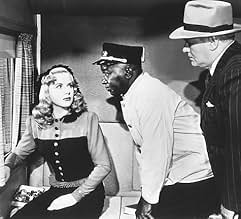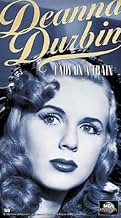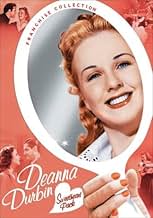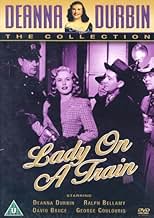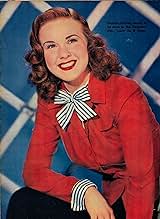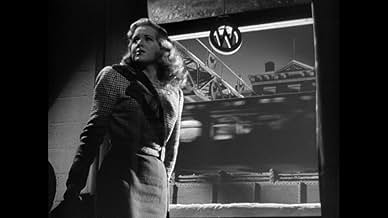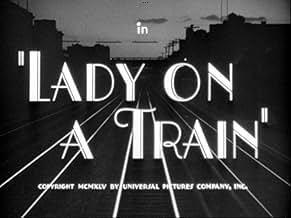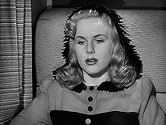IMDb RATING
6.7/10
2.7K
YOUR RATING
In New York, a woman who partially witnesses a killing from a train window seeks the aid of a crime novelist to solve the murder.In New York, a woman who partially witnesses a killing from a train window seeks the aid of a crime novelist to solve the murder.In New York, a woman who partially witnesses a killing from a train window seeks the aid of a crime novelist to solve the murder.
- Director
- Writers
- Stars
- Nominated for 1 Oscar
- 1 nomination total
Jacqueline deWit
- Miss Fletcher
- (as Jacqueline de Wit)
Jane Adams
- Circus Club Photographer
- (uncredited)
Fred Aldrich
- Cop in Lock-up
- (uncredited)
Ernest Anderson
- Train Porter
- (uncredited)
Carl Andre
- Man at Newsreel Theatre
- (uncredited)
Bobby Barber
- Man at Newsreel Theatre
- (uncredited)
- Director
- Writers
- All cast & crew
- Production, box office & more at IMDbPro
Featured reviews
This marks the first film I've seen by Ms. Durbin from beginning to end and I must say I found it to be a lot of fun. This film is without a doubt a star vehicle for Ms. Durbin; I think I counted 7 costume changes, at least 5 different blond hairstyles over the course of the picture and it was well directed by her husband Charles David. There was also the (I think) required scene where she got to speak to someone on a white telephone. The plot of the picture is that Ms. Durbin sees a murder from her train window and enlists the aid of a mystery writer to solve the crime. I am a fan of film noir and this film is sort of a combination film noir (good mystery plot, chases in dark alleys), musical (Durbin singing "Silent Night" and "Night and Day" among others)and comedy (many slapstick scenes involving Ms. Durbin as an amateur detective). You might even call this picture screwball noir. Ms. Durbin was probably the most popular star under contract to Universal until Abbott and Costello arrived and this film marked one of the few change of pace roles she was given and she literally shines in the part. The only negative comment I have is that there are a few dated racial stereotypes that I wish had been eliminated. Other than that, I found it to be stylish entertainment.
Talents as diverse as Deanna Durbin's charm and singing ability, Edward Everett Horton's flair for screwball comedy, and Dan Duryea's knack for portraying impish, enigmatic characters, are brought together here in a pretty good comic mystery. Neither the mystery story nor the comedy would have been enough to sustain a movie by itself, but they fit together well, with the help of an assortment of interesting characters and some well-chosen settings.
The mystery story is rather like a simplified (and less plausible) version of an Agatha Christie-style plot, and it seems likely that the similarity was intended. As you watch, you do want to see how it comes out, but in itself it's relatively insubstantial. The settings and characters provide more of the material for the cast to use. A couple of the settings were done quite nicely, especially the night club/dressing room set, which allowed for some interesting possibilities, and which also fits in pretty well with the story.
While it is true that nothing about "Lady On A Train" is exceptional, at the same time it has a lot of small strengths that add up to an enjoyable movie.
The mystery story is rather like a simplified (and less plausible) version of an Agatha Christie-style plot, and it seems likely that the similarity was intended. As you watch, you do want to see how it comes out, but in itself it's relatively insubstantial. The settings and characters provide more of the material for the cast to use. A couple of the settings were done quite nicely, especially the night club/dressing room set, which allowed for some interesting possibilities, and which also fits in pretty well with the story.
While it is true that nothing about "Lady On A Train" is exceptional, at the same time it has a lot of small strengths that add up to an enjoyable movie.
Lady on a Train is directed by Charles David and adapted to screenplay by Edmund Beloin and Robert O'Brien from a Leslie Charteris story. It stars Deanna Durbin, Ralph Bellamy, David Bruce, George Coulouris, Allen Jenkins, Dan Duryea and Edward Everett Horton. Music is by Miklos Rozsa and cinematography by Woody Bredell.
Part murder mystery, part film noir, part comedy and part musical! And it's a Christmas movie as well! Lady on a Train has a lot going on for sure. It's a fun packed little movie that gives Durbin full licence to show her various talents before she retired out of the limelight three years later. In main essence it's the murder mystery aspect that drives the picture forward. Durbin plays Nikki Collins, a spunky young woman who loves reading detective mysteries, so when she witnesses a murder being committed from her train window seat, she's obviously all of a tingle. However, convincing the authorities of what she saw proves to be difficult and she decides to take up the case herself. Pretty soon she is up to her neck in intrigue and life threatening peril.
Things start getting twisty once Durbin meets the victim's bizarre family, a veritable roll call of miserablists and shifty shysters. Aided by mystery writer Wayne Morgan (Bruce), Nikki has to run the gamut of bluffing and boldness to stay one step ahead of the game, including imitating a chanteuse singer. This allows Durbin to the chance to warble three songs, with a version of "Silent Night" beautifully tender and a sensuous and sultry rendition of "Gimme a Little Kiss, Will Yah, Huh?" Having us in the palm of her hand. It builds nicely to a darkly tinged last third, where Bredell's noirish photography comes into its own and the resolution of the tale is most satisfactory. Good laughs, good suspense and good songs, well worth a viewing. Story was filmed as a straight British thriller in 1940 titled A Window in London, with Michael Redgrave starring. 7/10
Part murder mystery, part film noir, part comedy and part musical! And it's a Christmas movie as well! Lady on a Train has a lot going on for sure. It's a fun packed little movie that gives Durbin full licence to show her various talents before she retired out of the limelight three years later. In main essence it's the murder mystery aspect that drives the picture forward. Durbin plays Nikki Collins, a spunky young woman who loves reading detective mysteries, so when she witnesses a murder being committed from her train window seat, she's obviously all of a tingle. However, convincing the authorities of what she saw proves to be difficult and she decides to take up the case herself. Pretty soon she is up to her neck in intrigue and life threatening peril.
Things start getting twisty once Durbin meets the victim's bizarre family, a veritable roll call of miserablists and shifty shysters. Aided by mystery writer Wayne Morgan (Bruce), Nikki has to run the gamut of bluffing and boldness to stay one step ahead of the game, including imitating a chanteuse singer. This allows Durbin to the chance to warble three songs, with a version of "Silent Night" beautifully tender and a sensuous and sultry rendition of "Gimme a Little Kiss, Will Yah, Huh?" Having us in the palm of her hand. It builds nicely to a darkly tinged last third, where Bredell's noirish photography comes into its own and the resolution of the tale is most satisfactory. Good laughs, good suspense and good songs, well worth a viewing. Story was filmed as a straight British thriller in 1940 titled A Window in London, with Michael Redgrave starring. 7/10
Deanna Durbin is a "Lady on a Train" in this 1945 mystery/comedy also starring David Bruce, Dan Duryea Edward Everett Horton, Ralph Bellamy, Patricia Morison, and George Coulouris. The film is directed by Durbin's future husband, Charles David.
Photographed and wardrobed like the great star she was, Durbin plays Nikki Collins, a débutante who comes to New York to spend the Christmas holidays with her aunt. On the train en route to Grand Central, she looks out the window and sees the murder of an old man. Determined to investigate, she appeals to the mystery writer whose novel she was reading (Bruce). She nearly wrecks his life. His fiancée (Patricia Morison) is suspicious of Nikki, and thanks to Nikki, he gets beat up a lot. Meanwhile, her father's assistant (Horton) can never find her. Nikki finds herself involved with the victim's money-grubbing family and puts herself in danger.
A screwball comedy with the delightful Durbin doing a great job, singing like a dream, and looking fabulous. It's very slight but fun and directed by David with a good pace. The child Durbin was a little manic for me, but I love her adult work. Plus, she had possibly the best voice and best trained voice in films. The rest of the cast is wonderful, particularly David Bruce as the hapless author.
It's a shame that Universal, with such a valuable commodity, didn't buy and/or develop better properties for her. Durbin is often compared with Judy Garland, who definitely got better treatment at MGM.
Durbin was smart to retire while at the top, though with the coming musicals of the '50s, I'm sure her star would have risen even higher. In many hearts, 60 years later, she's still a star.
Photographed and wardrobed like the great star she was, Durbin plays Nikki Collins, a débutante who comes to New York to spend the Christmas holidays with her aunt. On the train en route to Grand Central, she looks out the window and sees the murder of an old man. Determined to investigate, she appeals to the mystery writer whose novel she was reading (Bruce). She nearly wrecks his life. His fiancée (Patricia Morison) is suspicious of Nikki, and thanks to Nikki, he gets beat up a lot. Meanwhile, her father's assistant (Horton) can never find her. Nikki finds herself involved with the victim's money-grubbing family and puts herself in danger.
A screwball comedy with the delightful Durbin doing a great job, singing like a dream, and looking fabulous. It's very slight but fun and directed by David with a good pace. The child Durbin was a little manic for me, but I love her adult work. Plus, she had possibly the best voice and best trained voice in films. The rest of the cast is wonderful, particularly David Bruce as the hapless author.
It's a shame that Universal, with such a valuable commodity, didn't buy and/or develop better properties for her. Durbin is often compared with Judy Garland, who definitely got better treatment at MGM.
Durbin was smart to retire while at the top, though with the coming musicals of the '50s, I'm sure her star would have risen even higher. In many hearts, 60 years later, she's still a star.
Deanna Durbin was truly a Hollywood phenomenon. Never comfortable as a film star, she exuded just enough conflicting emotion to make her screen persona fascinating.
In film after film, regardless of the part or situation, Durbin was never entirely at home before the camera or in her roles. True, she put up a great front, and by her mid teens was the highest paid female in the world.
Audiences loved her, supported her films, bought Durbin dolls, and reveled in her fan clubs. But Durbin herself apparently couldn't have cared less.
"Lady on a Train" is a case in point: her fifth to final film made at age 24 just 3 years before she retired at age 27, is a quirky hybrid of murder mystery, musical, and comedy. It gives Deanna a chance to flex her adult acting chops, while offering ample opportunities to warble vocal selections.
Durbin's dichotomy of between being on camera while wishing she were somewhere else is what provides her personality intrigue. Despite her infectious smile and gorgeous natural voice, Durbin's persona was negative.
What saved her was that she was a very good actress, and in fact became the saving grace of Universal Studios. Finally finding salvation in marriage to her "Lady on a Train" director, she kissed everything goodbye and left filmdom at the peak of her powers.
I'm sure she found what she was looking for in that quaint Parisian suburb, and that she may have significantly extended her longevity in the process. In the meantime, she left her public with some very pleasant films to enjoy.
In film after film, regardless of the part or situation, Durbin was never entirely at home before the camera or in her roles. True, she put up a great front, and by her mid teens was the highest paid female in the world.
Audiences loved her, supported her films, bought Durbin dolls, and reveled in her fan clubs. But Durbin herself apparently couldn't have cared less.
"Lady on a Train" is a case in point: her fifth to final film made at age 24 just 3 years before she retired at age 27, is a quirky hybrid of murder mystery, musical, and comedy. It gives Deanna a chance to flex her adult acting chops, while offering ample opportunities to warble vocal selections.
Durbin's dichotomy of between being on camera while wishing she were somewhere else is what provides her personality intrigue. Despite her infectious smile and gorgeous natural voice, Durbin's persona was negative.
What saved her was that she was a very good actress, and in fact became the saving grace of Universal Studios. Finally finding salvation in marriage to her "Lady on a Train" director, she kissed everything goodbye and left filmdom at the peak of her powers.
I'm sure she found what she was looking for in that quaint Parisian suburb, and that she may have significantly extended her longevity in the process. In the meantime, she left her public with some very pleasant films to enjoy.
Did you know
- TriviaDeanna Durbin and director Charles David were wed in 1950 and retired to a life in rural France. They remained married until his death in 1999.
- GoofsWhen Mr. Haskell leaves Grand Central Station with Nikki Collins, they call for a taxi. When a taxi pulls up, however, Nikki's luggage is already piled in the front seat though she did not walk out with any bags nor did a porter load any luggage into the taxi. The taxi wasn't there waiting for them; it was just a random taxi that happened to pull up. The sequence, therefore, doesn't make any sense, and it interrupts the flow of the story.
- Quotes
Nikki Collins: I just saw a murder.
- ConnectionsEdited into Christmas Hymns (1954)
- SoundtracksSilent Night
Original lyrics by Joseph Mohr (uncredited)
Melody by Franz Xaver Gruber (uncredited)
English translation by John Freeman Young (uncredited)
Details
Box office
- Gross worldwide
- $34
- Runtime1 hour 34 minutes
- Color
- Aspect ratio
- 1.37 : 1
Contribute to this page
Suggest an edit or add missing content



